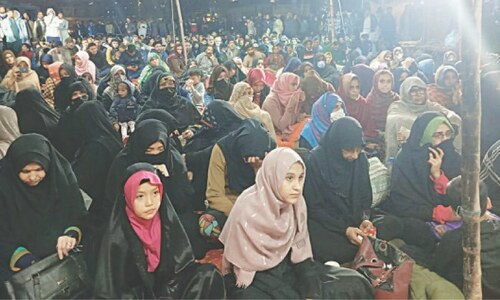KARACHI: “Women in our society remain united in keeping their mouths shut and they are divided when it comes to speaking up,” said television actor Saba Hameed during a panel discussion on the ‘Me Too’ campaign at Tehrik-i-Niswan’s fourth Karachi Women’s Peace Table on Saturday.
The event was held on the theme of ‘Sexual harassment in all its forms and manifestations’.
The moderator of the discussion, Mohsin Sayeed, had asked Ms Hameed about the case regarding her daughter, Meesha Shafi, and Ali Zafar. She, however, made it clear that she did not want to speak about the latter.
“The women become targets of character assassination, they are criticised for the type of clothes they wear and other things. And as there is a thing called the ‘bro code’, we see all the men, even if they don’t like each other, uniting against the woman,” Hameed said.
Senior television and theatre artist Samina Ahmed said that women were perceived differently in their field. “They are like second-class citizens, without rights. There are plenty of biases against women,” she said.
In another panel discussion on sexual harassment in and at educational institutions, Karachi University teacher Dr Navin Ali Haider spoke about her case against a senior professor emeritus of KU who misbehaved with her.
The charter of demands includes removing gender biases from educational curricula
“I also had students coming to me with complaints about him too after raising my voice but that was when many university officials sided with him while pointing a finger at me. It became so bad that I found myself confined to my office as every other person was hostile to me,” she said.
“But I must say that educated people like us should first read the laws on harassment before complaining about such men as there are so many things that can be used against us,” she said.
Dr Arfana Mallah said that harassment did not have to be of sexual kind.
Speaking about her case at Sindh University, she said that she had complained about a corrupt university official following which his friends started criticising her character.
At another panel about the Sexual Harassment Act, lawyer Abira Ashfaq pointed out that someone doing very well in life or someone very famous could also be someone teasing or harassing women.
Lawyer Sana Farrukh spoke about supporting your friends who were raising their voice against sexual harassment instead of doubting them.
Farieha Aziz — one of the founders of Bolo Bhi, a non-governmental organisation — drew the audience’s attention towards the cybercrime law as “today many women are also harassed online”.
Senior journalist Zubeida Mustafa spoke about trafficking of young girls.
“Thousands of poor and young girls are kidnapped by their own relatives and sold into the flesh market,” she said. “These girls are then seen as bad women but they are little girls who don’t even know anything. It is a billion-dollar industry all over the world but we should at least raise our voice here against this.”
There were also song and dance performances and skits before and after each panel discussion and talks.
The upbeat, hopeful qawwali ‘Darya ki kasam, mojoan ki kasam ye tana bana badle ga ...’ was loudly cheered and applauded by the audience and the song ‘Sikoan mein na tole, har aurat anmol ...’ brought on a proud feeling making everyone in the audience want to hold their head high. But the one about ‘Mullah Shalwari’ sung on the tune of the classic ‘Ko Ko Korina’ drew many laughs.
Earlier, the founder of Tehrik-i-Niswan, Sheema Kermani, provided a bit of background about the Women’s Peace Table.
She said that the Peace Women Across the Globe (PWAG) is a network bringing together women striving for peace with equality and justice worldwide since 2005.
Ms Kermani is one of the 1,000 global women nominated for the Nobel Peace Prize in 2005. Though the peace prize was not given to the 1,000 women, the nominees convene peace tables in their countries every year. The Tehrik-i-Niswan held its first one in 2015 and this year it was their fourth edition.
The conclusion of the programme saw reading of the charter of demands which included ending impunity for all those who harass women and girls, and others; strengthening the 2010 law against sexual harassment by closing its loopholes and omissions; training the police and judiciary to take sexual harassment cases seriously under the law without sexist biases; removing gender biases from educational curricula; believing and taking seriously sexual harassment and assault allegations; no naming and shaming of survivors and selecting of women as the ombudspersons on sexual harassment transparently on merit.
The charter of demands will now be sent to the national and provincial commissions on the status of women, the federal and provincial ministers for human rights, provincial departments of women’s development, the existing federal and provincial ombudspersons on sexual harassment and all the relevant standing committees of parliament and provincial assemblies.
Published in Dawn, October 28th, 2018
Download the new Dawn mobile app here:















































Dear visitor, the comments section is undergoing an overhaul and will return soon.